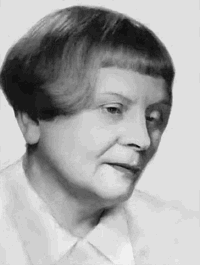
Born: October 6, 1889 in Russow, Prussian partition of Poland, (presently Poland)
Died: May 19, 1965 in Warsaw, Poland
Early days. She was born to impoverished landed gentry. Her father, Jozef Szumski, January 1863 insurgent, was an administrator of estates; her mother was Ludomira nee Galczynska. They lived in a modest mansion in Russow near Kalisz. From 1901 till 1905 she attended Semadeni private school and later a high school for girls. During the years 1907-1914 she studied natural sciences, economics and sociology at the universities of Lausanne (Switzerland) and Brussels (Belgium). In 1911 she returned to Kalisz to teach geography and a year later she married Marian Dabrowski, a socialist activist (PPS), friend of Jozef Pilsudski.
Literary career. In 1917 she moved to Warsaw. During 1918- 1924 she worked in the Polish Ministry for Agriculture, but became more and more engaged into newspaper reporting and into public life. After her husband's death in 1925 she lived with an estate owner and co-founder of Freemasonry Stanislaw Stempowski until his death in 1952. In 1927 she became involved in writing against human rights violations in Poland. During the occupation of Poland she stayed in Warsaw and supported the cultural life of the Polish underground. In her novels, plays and newspaper articles she analyzed the mental consequences of the world's events on everyday citizens. In 1954 she came to live with a writer Anna Kowalska. Later she lived in her own house in Komorow near Warsaw. Among her friends were: poets Illakowiczowna and Jastrun, writers Andrzejewski, Iwaszkiewicz, Wankowicz, Zawieyski and Zukrowski, actress Barszczewska and painter Jozewski. Dabrowska was close to leftist traditions of intelligentsia but far from Marxism and communism. She was fascinated by the cooperative movement. She kept her distance from Stalin's political system but-like many public figures- succumbed to requests to write Stalin's obituary albeit cool and without panegyrics. After 1956 she joined the internal opposition expressing privately her empathy to emigres Gombrowicz and Milosz in her posthumously published Dzienniki (Memoirs). She was also one of the signatories of the List 34 (The Letter of 34). At that time, fascinated by the humanism of John XXIII, she came closer to the Catholic church and in her last will she requested Catholic funerals.
Dabrowska's masterpiece was the novel Noce i dnie (Nights and Days) 1932-1934. It is composed of four parts: I Bogumil i Barbara (Bogumil and Barbara) 1932, II. Wieczne zmartwienie (Permanent worries), 1932, III. Milosc; (Love), 1933, IV. Wiatr w oczy (Headwind) 1934. Her Dzienniki (1914-1965) include her autobiography and particularly interesting memories from Stalin's time. She was also translating: from English The Diary by Samuel Pepys, from Russian- Anthony Czechow's tales and from Danish Niels Lyhne by Jacobsen. A Polish film Noce i dnie, based on her novel, was produced in 1975.
Honors. 1957 Doctorate honoris causa from Warsaw University; 1960 honorary citizenship of Kalisz.
This article uses, among others, material from the Wikipedia article "Maria Dabrowska" licensed under the GNU Free Documentation License. :
Wikipedia (in Polish) List of works
Biography by Wlodzimierz Garsztka (in Polish)
IMDb "Noce i dnie" (the movie)
English translations of some of her works:
Constance J. Ostrowski
Return to home page:
Prominent Poles